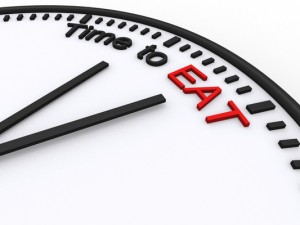 Is your holiday mindset: lots of food = good time; not so much food = bad time? Can you possibly revel in holiday spirit without accompanying gluttony? You bet you can – but often the celebrations themselves become intertwined with the need or obligation to cook and/or eat not just because we’re hungry, but because of other reasons that are important to you.
Is your holiday mindset: lots of food = good time; not so much food = bad time? Can you possibly revel in holiday spirit without accompanying gluttony? You bet you can – but often the celebrations themselves become intertwined with the need or obligation to cook and/or eat not just because we’re hungry, but because of other reasons that are important to you.
The point of the holidays – any holiday – is not exclusively food. Nonetheless, we wrap our holiday thoughts around food – after all, Thanksgiving originally was a harvest celebration and many cultures and religions have special foods to signify a special holiday.
Food Has Meaning
Food does have meaning–which may have different interpretations by people of varying religions, ethnicities, and cultures. Food acts like a cloak of comfort – something many of us look for and welcome around the holidays.
Nowhere is it written that food has to be eaten in tremendous quantity – or that a meal has to include stuffing, two types of potatoes, five desserts, or six types of candy. That idea is self-imposed.
So is the opposite self-imposed idea: trying to diet during the holidays. Restriction and overeating are both difficult – and often equally counterproductive. Winter holiday eating comes during the cold and dark seasons in many parts of the world. Warm comfort food just seems all the more appealing — whether you’re dieting or not — when it’s somewhat inhospitable outside.
Is Overeating Part Of Your Holiday Meal Plan?
Unconsciously, or perhaps habitually, a lot of us actually plan to overeat during the holidays. Be honest: do you know that you’re going to overeat? Do you think it wouldn’t be normal or non-celebratory to overindulge and eat three desserts at Christmas or raid your kid’s Trick or Treat bag?
It’s all too easy to do that. Food is absolutely everywhere. It’s there for the taking — and most of the time, holiday food is free (and in your face) at parties, on receptionist’s desks, as sample tastes while you shop. How can you pass it up?
On top of it all, it’s sugary, fatty, and pretty. How can you not try it? Of course, sugary and fatty (salty, too) means you just crave more and more. Do you really need it? Do you even really want it? If you eat it, will you feel awful later on?
Eating And Tradition
Are you eating because of tradition – because you’ve been eating the same food at Christmas or Hanukkah or Kwanzaa since you were a kid? Maybe you don’t even like the food anymore. Maybe it disagrees with you or gives you acid reflux. So why are you eating it? Who’s forcing you to?
Do you think you won’t have a good time or you’ll be labeled Scrooge, Grinch, a party pooper, or offend your mother-in-law if you don’t eat everything in sight? Get over it. Do you really think you’re Scrooge?
You can still love the holidays and you can still love the food. No problem. In the grand scheme of things overeating on one day isn’t such a big deal. Overeating for multiple days that turn into weeks and then months, is.
Do You Really Want To Overeat?
The question is: do you really want to overeat? If you do, fine. Enjoy every morsel and then take a nap. Tomorrow is another day. Just know that you don’t have to. You control the purse strings – and the decisions about what goes into your mouth. Make thoughtful choices, the best choices for you, and enjoy them along with everything else the holiday represents.


